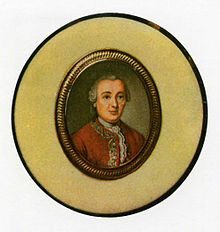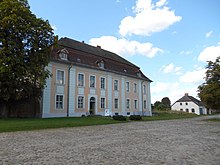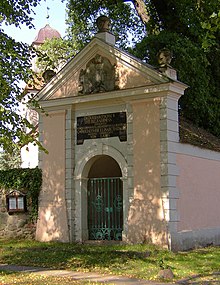Michael Gabriel Fredersdorf
Michael Gabriel Fredersdorff (* 1708 in Gartz an der Oder ; † January 12, 1758 in Potsdam ) was the secret chamberlain and confidante of Frederick the Great .
Life
Fredersdorff was the son of the Gartzer Stadtmusicus and was baptized on June 3, 1708. As a young man he served as a senior boist in the Prussian musketeer regiment " Schwerin zu Fuß ", whose garrison town was Küstrin . In 1730 Friedrich, then still crown prince , became aware of Fredersdorff, who like himself was a talented flautist . After the rift with his father Friedrich Wilhelm I, Friedrich had to serve as an officer under strict conditions and under supervision as an intern at the Küstrin Fortress , although he was expressly forbidden to make music; so he met in secret to play the flute with Fredersdorff.
After his time in Küstrin, Fredersdorff, who had earned the special trust of the Crown Prince, became his valet and held this position during Friedrich's years in Rheinsberg .
After Friedrich had ascended the throne in 1740, he raised Fredersdorff to the position of secret chamberlain and treasurer to the custodian of his box in September . In addition, he was given numerous responsible tasks that went far beyond the usual duties of a treasurer; Among other things, he was not only initiated into secret service operations, but also coordinated them. In addition, he continued to be Friedrich's closest confidante, who consulted with him on many private and public problems. An extensive private correspondence between Fredersdorff and the king, which documents this extraordinary relationship of trust, has been preserved to this day.
There was already much speculation among contemporaries about a (perhaps only in the early days) (love) relationship between the Crown Prince / King and Fredersdorff, but so far there was no clear evidence; Friedrich's garden inspector and chief building officer Heinrich Ludwig Manger describes the former valet in 1789 as "the king's darling at the time" . Fredersdorff's bedroom in Sanssouci Palace can still be seen today and is right next to Friedrich's. Voltaire wrote in his diatribe Memoires with reference to Friedrich's imprisonment in Küstrin:
“… He was locked up there for six months, without servants, in a kind of dungeon; a soldier was only given to serve him after six months. This soldier - he was young, handsome, well built, and played the flute - served the prisoner as encouragement in more than one way. All these good qualities later made his fortune. I saw him as valet and first minister in one and with all the arrogance to which these two offices help. "
In gratitude for his services, Fredersdorff received the Zernikow estate near Rheinsberg as a gift from him on June 26, 1740, just under a month after Friedrich's accession to the throne . In the following years he expanded the property considerably through acquisitions to the complex of Fredersdorffischen goods .
On December 23, 1753, he married Caroline Marie Elisabeth Daum (* July 27, 1730 in Potsdam; † March 10, 1810 in Berlin ), daughter of the wealthy rifle manufacturer and Prussian court banker Gottfried Adolph Daum , who had once discretely granted loans to Crown Prince Friedrich and received large armaments orders from him in the Silesian Wars. Friedrich reacted to the marriage with mockery and recommended Fredersdorff in a letter to "take a little page with you". The marriage remained childless.
On April 9, 1757, Friedrich II dismissed Fredersdorff from his office as secret chamberlain. The reason was "dishonesty together with the war and domain councilor Johann Pfeiffer" when acquiring Kiekemal / Mahlsdorf.
Fredersdorff died in 1758. "He consumed himself out of grief for his lost honor." He was buried in Zernikow, where his body had been transferred. For the first twenty years his coffin was in a crypt below the local church. After completion of the hereditary burial , which his bereaved wife had built, the reburial took place in 1777. The woman herself and members of her future family were also buried here. The tomb, desecrated in the turmoil after World War II, was restored in 2000.
After his death, Caroline Marie Elisabeth Daum married a chamberlain of Frederick the Great, Johann Labes, and through him became the grandmother of the poet Achim von Arnim , whom she raised in her house ( Palais Arnim ).
literature
- Johannes Richter (ed.): The letters of Frederick the Great to his former valet Fredersdorff. Klemm, Berlin 1926 (Unchanged reprint. Steiger, Moers 1979, ISBN 3-921564-19-0 ).
Web links
- Gut Zernikow: Chronicle 1730–1760
- Correspondence between Frederick the Great and Fredersdorf (digital edition of Trier University Library)
- Oliver Das Gupta, Friedrich the Great: The gay Fritz , January 23, 2012, Süddeutsche Zeitung
Individual evidence
- ^ Heinrich Ludwig Manger (garden inspector and chief building officer): Heinrich Ludewig Manger's building history of Potsdam, especially under the government of King Frederick the Second. Volume 1, Nicolai, Berlin / Stettin 1789/90, in the report on the dismissal of the building manager of Sanssouci, Friedrich Wilhelm Diterichs , who "did not court enough" to Fredersdorf. See also Friedrich II. (Prussia) #relationships .
- ↑ Voltaire on the King of Prussia, Memoirs , ed. u. Translated by Anneliese Botond (Title of the original edition: Memoires pour servir à la vie de M. de Voltaire, écrits par lui-même ), Frankfurt / M. (Insel Verlag), 1981 (first edition 1967), page 11. In fact, Frederick's captivity at the Küstrin Fortress only lasted from September 2 to November 19, 1730. The Crown Prince's service in Küstrin, under strict supervision, ended on September 26. February 1732.
- ^ Lewis Compton, Homosexuality and Civilization , Harvard University Press, 2003, p. 203
| personal data | |
|---|---|
| SURNAME | Fredersdorf, Michael Gabriel |
| ALTERNATIVE NAMES | Fredersdorff, Michael Gabriel |
| BRIEF DESCRIPTION | Secret chamberlain and confidante of Frederick the Great |
| DATE OF BIRTH | baptized June 3, 1708 |
| PLACE OF BIRTH | Gartz (Or) |
| DATE OF DEATH | January 12, 1758 |
| Place of death | Potsdam |



